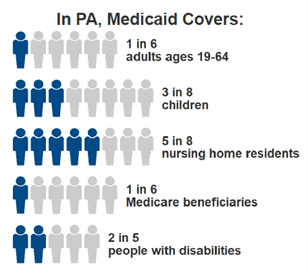- Understand how enabling behaviors develop;
- Identify the relationship between substance use, recovery, and enabling behaviors; and
- Identify coping mechanisms of family members.
The Office of Developmental Programs (ODP) is currently seeking individuals that would like to record and share their physical activity participation and providers that would like to have their physical activity programs featured with ODP’s stakeholders across the Commonwealth. Your activities can be an inspiration to others to get healthier! If interested, or if you would like more information, please respond via email with “Move Your Way” in the subject line.

Benefits of Being Physically Active
Adults should aim for at least 150 minutes of aerobic activity that gets your heart beating faster, like taking a walk or going for a bike ride. Adults also need at least 2 days of muscle-strengthening activity each week. Anything that makes your muscles work harder than usual, like yard work, chores around the house, or lifting weights, counts! Regular physical activity during the week and throughout your lifetime can help lower the risk of health conditions, such as Type 2 diabetes and heart disease. Regular physical activity also provides many immediate benefits such as: improved sleep and improved ability to fight infections, reduced symptoms of depression, and strengthened social connections while also sharpening your focus and reducing stress.
Outdoors Cold Safety
*If you have questions about how you or someone you support can get active safely during cold weather, you can contact a healthcare provider to discuss.

Message from Representative Dan Miller’s Office:
Supporting and defending Medicaid funding to our Commonwealth has always been a top priority of mine, and this week we’re having a press conference to discuss the potential impact that Federal cuts to Medicaid may have on our most vulnerable populations.
Joining me will be U.S. Reps. Chris Deluzio and Summer Lee, other state lawmakers, and Allegheny County officials to highlight why defending Medicaid is imperative. We will also hear from self-advocates who would be directly impacted by Medicaid changes.
 The loss of Federal funding to states would be devasting for the more than 3 million Pennsylvanians who are enrolled in Medicaid. Medicaid also pays for 30% of Medicare. Those that depend on its supports and services, include:
The loss of Federal funding to states would be devasting for the more than 3 million Pennsylvanians who are enrolled in Medicaid. Medicaid also pays for 30% of Medicare. Those that depend on its supports and services, include:
The news conference will be held at 10:15 am Friday, February 28, at the Portico of the City-County Building, 414 Grant St., Pittsburgh.
We’ll also be joined by state Reps. Dan Frankel, Emily Kinkead, Jess Benham, Lindsay Powell, Aerion Abney, La’Tasha D. Mayes and Arvind Venkat; state Sens. Jay Costa, Wayne Fontana, Lindsey Williams and Nick Pisciottano; Mayor Ed Gainey; Allegheny County Controller Corey O’Connor; Pittsburgh Councilwoman Erika Strassburger; and the offices of County Executive Sara Innamorato and U.S. Sen. John Fetterman.
There is a lot to be discussed, and everyone is welcome to join us this Friday at 10:15 am at the Portico of the City-County Building located at 414 Grant Street in downtown Pittsburgh.
As always, if you have questions about this event or any state-related matter, please contact our office at 412-343-3870 or [email protected].
|
|

The Pennsylvania Department of Human Services (DHS) is holding a post-award forum to afford the public with an opportunity to provide comments on the progress of the federal Section 1115 Demonstration titled “Medicaid Coverage for FFCY from a Different State and SUD Demonstration.” The FFCY component of the demonstration was approved by the Centers for Medicare & Medicaid Services (CMS) effective October 1, 2017, and enables the Commonwealth to provide Medicaid coverage to out‑of‑state former foster care youth under the age of 26 years who were in foster care under the responsibility of another state or tribe when they turned 18. The SUD component of the demonstration was approved by CMS effective July 1, 2018, and provides necessary funding that is critical to continue supporting the provision of a full continuum of medically necessary SUD services, including residential services. In September 2022, CMS approved the Commonwealth’s application to renew the Demonstration through September 30, 2027.
The forum will be held on Friday, March 28, 2025, from 2:00 pm – 3:30 pm via WebEx. Please register for the Post Award Forum prior to the meeting date here.
Please contact RCPA Policy Associate Emma Sharp with any questions.
Monday, March 3, 2025
12:00 pm – 1:00 pm EST; 11:00 am – 12:00 pm CST;
10:00 am – 11:00 am MST; 9:00 am – 10:00 am PST
Register Here
Tiffany Prince-Kandrakota, PT, DPT, MSHQS
Presenter Bio:
Tiffany Prince-Kandrakota is a physical therapist with more than 20 years of experience. Her career has included clinical work as well as progressive leadership responsibilities in multiple large health systems in the Philadelphia area. In this time, she found a passion for the quality of the care that was being provided, which drove her to return to school for a Masters in Healthcare Quality and Safety. She currently works as the Rehabilitation Quality Improvement Coordinator at Children’s Hospital of Philadelphia.
Objectives: At the end of this session, the learner will:
Audience: This webinar is intended for all interested members of the rehabilitation team.
Level: Beginner-Intermediate
Certificate of Attendance: Certificates of attendance are available for all attendees. No CEs are provided for this course.
Complimentary webinars are a benefit of membership in IPRC/RCPA. Registration fee for non-members is $179. Not a member yet? Consider joining today.

Spotlight PA is covering Pennsylvania’s drug addiction crisis, its impact on children and families, and the potential to use opioid settlement funds to address associated problems. To help inform its coverage, the publication is seeking stories about how the opioid epidemic and addiction has affected Pennsylvanians, including frontline perspectives from healthcare workers, child welfare workers, counselors, first responders, and others addressing these issues regularly.
More information, including a form for submitting responses, can be found on Spotlight PA’s website.
The Office of Developmental Programs (ODP) has shared an update to ODPANN 24-110. This update is to announce the new Deaf Services required training. This training is replacing the previously required Harry M Settlement training. Please review the announcement for additional information and details. Corrections to the original announcement are in red.
Please use this version of the announcement going forward.
Members of the Information Sharing and Advisory Committee (ISAC), working with the PA Office of Developmental Programs (ODP), developed a series of recommendations and strategies to support achievement of the vision in Everyday Lives. This publication provides 2024 updates related to those recommendations and strategies. Stakeholders are encouraged to use the information contained in this report in their work supporting people with disabilities.
Both documents can also be found by visiting MyODP and following this path: Everyday Lives > Everyday Lives Publications Recommendations, Strategies, and Performance Measures.